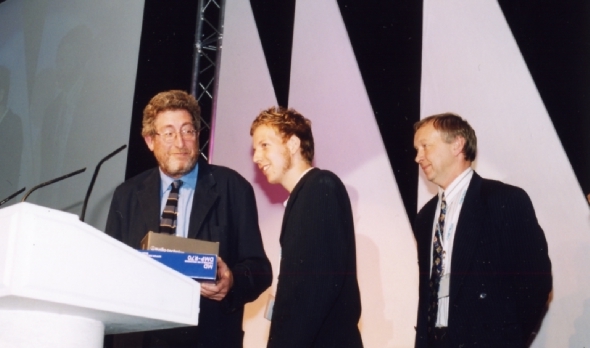
The
Linda Gage Memorial Award
1999
For the third year running, entries were invited for short features which demonstrate entrant’s production skills and was open to anyone who was either on a recognised training course or who had recently completed such a course.
This year’s prize included a portable mini disc recorder, a place at the 1999 Radio Festival and a year's subscription to The RADIO Magazine. The award was presented at the Radio Festival in Cardiff in July.
The Linda Gage Memorial Award was supported in 1999 by the Radio Academy, Star FM, Action for Airtime Ltd, The RADIO Magazine, IRN and The Radio Partnership.
The winning entry was submitted by Stuart Silver, a radio student from the Cultural Partnership training organisation in East London.
The award, now in its third year, attracted a record number of entries from radio students from all parts of the United Kingdom. The judges commented that they, “hope and expect that students will be bold and choose unusual topics and treat subjects freshly. Humour helps too but that was absent, apart from the well-constructed witty item on ‘Mornington Crescent’. On the whole, the subject matter of the entries was quite conventional and traditional. There are exceptions - the item on female masturbation. This was a brave piece and attempted to break barriers.
In making the award to Stuart Silver, the judges commented that they were impressed by, “his liveliness, enthusiasm, humour and his ability to make the listener see what he could see. He can handle live situations or make an item sound ‘as live’ - a quality that all editors are looking for.” Stuart’s entry was a short feature about cruises aboard the London Showboat on the River Thames. (Click here for the judges comments in full).

The prize was presented to Stuart on Friday 16 July 1999 at the Radio Festival in Cardiff.
The Linda Gage Memorial Award 1999
Judges Comments
The Linda Gage Memorial Award is a competition open to broadcasting students. The brief is to produce a short feature and to show where it would fit into the broadcasting spectrum. Above all, the judges look for potential. They hope to find a well-presented interesting subject. They want a cue that grabs the attention and is informative. They want to hear an item that has been thought through imaginatively, with a hook at the beginning, with a middle and a conclusion. They look for use of radio techniques, guests that are relevant and, music and sound effects that add to and illustrate the piece. Lively, authoritative presentation is essential. The “sound” is so important. This is where most entries fall down. Most young journalists can write a feature, illustrate it with appropriate sound effects or music.
Presentation
However, the judges cannot stress how important it is
for the reporter or presenter to sound interested and lively. If the
feature does not sound lively at the outset, the listener will turn
off. Course tutors should get their students to play their pieces to
friends, students and ask -
Would you listen to this?
or
Would you quickly change stations?
Broadcast courses must pay more attention to voice production. Remember radio is a sound medium.
Subject Matter
Generally, entries this year are an improvement on
last year, particularly the technical quality. The range of topics is
good but not good enough. Judges hope and expect that students will
be bold and choose unusual topics and treat subjects freshly. Humour
helps too but that was absent, apart from the well-constructed witty
item on “Mornington Crescent”. On the whole, the
subject matter of the entries was quite conventional and traditional.
There are exceptions - the item on female masturbation. This was a
brave piece and attempted to break barriers - and an atmospheric
Irish tone poem.
The judges have chosen as the winner of the Linda Gage Award this year - Stuart Silver. He impressed the judges by his liveliness, his enthusiasm, his humour and his ability to make the listener see what he could see. He can handle live situations or make an item sound ‘as live’ - a quality that all editors are looking for.
Brian Hayes/Lawrie Douglas
July 1999